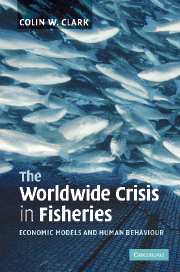4 - Fisheries Management
Published online by Cambridge University Press: 03 February 2010
Summary
Fisheries management techniques can be divided into two classes, those that do not specifically address the open-access aspect of the fishery, and those that do. The first class includes the traditional methods of total catch quotas (TACs), area and seasonal closures, gear regulations, and the like. These methods can succeed in preventing overfishing and resource depletion, but they usually also lead to excess fishing capacity, for reasons set out in Chapter 3. Attempts to reduce overcapacity through license limitation and buy-back programs often encounter difficulties as discussed also in Chapter 3.
In this chapter we discuss management methods that directly counter the open-access problem. Two approaches that will be analyzed are first, taxes or royalties on the catch (or on effort), and second, individual catch (or effort) quotas. These can also be used in combination. We will use the term “royalties,” rather than “taxes,” to stress the point that these charges pertain to the right to exploit a publicly owned resource. (Besides, everyone abhors taxes, but charging royalties, or user fees, for the right to harvest a publicly owned resource may seem fair to most people.) Both methods—royalties and individual quotas—alter the economic incentives of fishermen in a way that promotes both economic efficiency and resource conservation. Clearly, however, royalties and individual quotas have opposite distributional implications. Royalties capture resource profits for the government, whereas individual quotas (if freely awarded) grant profits to the quota recipients. Not surprisingly, the fishing industry has exhibited a preference for individual quotas, often arguing that royalties would be unfair.
- Type
- Chapter
- Information
- The Worldwide Crisis in FisheriesEconomic Models and Human Behavior, pp. 145 - 204Publisher: Cambridge University PressPrint publication year: 2007



